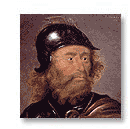| |
|
|
In 1315 at the battle of Bannochburn, the
English were defeated by  Robert
Bruce king of Scotland and his brother Edward thereby gaining
their independence from England. After Bannochburn Edward, Earl
of Carrick in Galloway, had thousands of soldiers at his disposal. Robert
Bruce king of Scotland and his brother Edward thereby gaining
their independence from England. After Bannochburn Edward, Earl
of Carrick in Galloway, had thousands of soldiers at his disposal.
Anglo-Norman power in Ireland began to
fade, more and more of the country fell back into the hands of
the Gaels. Donal ONeill and and a collocation of other Lords impatient
to see the end of Norman rule invited Edward Bruce to Ireland
in 1315.
On May 25th he landed a force of some six
thousand men at Larne in county Antrim. These mail clad battle
hardened veterans, were soon joined by large numbers of Irish
infantry, led by Donal ONeill and other lesser chieftains.
This Scottish-Irish alliance proved to be
almost invincible, proceeding from victory to victory. They defeated
de Lacys and Hugh de Montford at Kells and won many other battles
further south. One prize that eluded them was Carrickfergus castle
which was still in the hands of the English. At the outset Edward
left a portion of his army to lay siege to the castle. During Easter
1316 Sir Thomas de Mandeville attempted to relieve the castle by
sea but was defeated and killed.
After about a year on 1st May 1316 Edward
crowned himself king of Ireland at Dundalk. By September that year
he was joined by his brother Robert, by then most of northern portion
of Ireland was under his control, September of that year saw the
surrender of Carrickfergus.
The two brothers took most of the midlands,
but Dublin eluded them, mainly because as was the case in Carrickfergus,
they lacked siege engines. Their conquest and pillage of the country
to sustain their armys, led inevitably to famine. In 1317 Robert
went north to Ulster and from thence to Scotland to attend to his
business there, promising to send men and supplies.
|
By 1318 most of the island was in the grip of famine,
one notable battle took place near Ennis county Clare, in the battle of
Disert O'Dea the O'Brien's regained their kingship. The tide of good fortune
was about to turn against Edward, in the late summer of 1318 a superior
force led by John de Birmingham was marching against him.
The two armies met on 14th October 1318 at Faughart
near Dundalk county Louth, Edward was killed and his army defeated, the
surviving remnants of Bruce's army returned home as best they could, his
Irish allies suffered greatly after the defeat.
Following the defeat of Bruce the country was in
a dreadful state, the warfare and pillaging allied with the fact that
the previous year had been exceptionally wet, resulting in spoiled grain
harvests which precipitated a general famine throughout Europe.
A contemporary annalist wrote of Bruce at the time
"No better deed was performed since the beginning of the world,
than the slaying of Edward Bruce. The destroyer of all Erinn in general
both English and Gael."
Edward Bruce was buried in the churchyard at Faughart
near Dundalk County Louth.
|
|